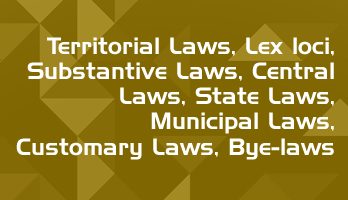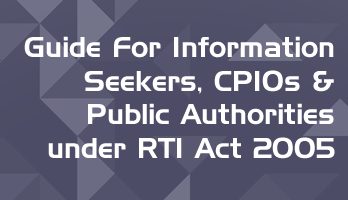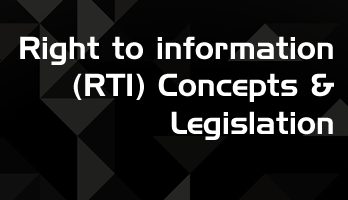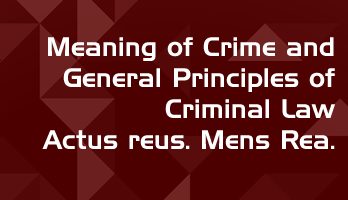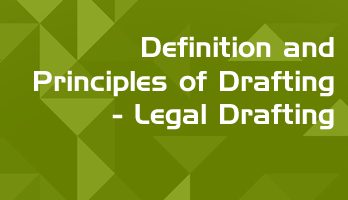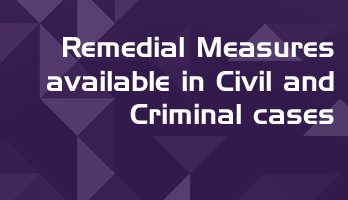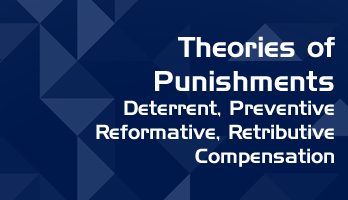Free Full Course Available on LawMint's YouTube Channel
How to Land Your Dream LLB Internship in a Top Law Firm
- Part 1 - Introduction
- Part 2 - Internship Planning
- Part 3 - Internship Research
- Part 4 - Building Your Profile
- Part 5 - The Email
- Part 6 - The Resume
- Part 7 - The Cover Letter
- Part 8 - The Interview
- Part 9 - Self Development
Practical and comprehensive course, with real examples and step-by-step analysis of the complete internship application process. Check out LawMint's YouTube channel now!
General Defences in Criminal Law
In Criminal Law there are number of ‘defences’ available to the accused. These defences are listed as below:
Insanity or mental disorder
It is the most common defence used by the accused at large to negate the crime effect. Here the accused is declared to be suffering from mental disorder and is not able to take any sensible decision as the accused cannot make a difference between right and wrong.
Automatism
It means there must have been a total destruction of voluntary control. This destruction of voluntary control excludes a partial loss of consciousness as the result of driving for too long. Thus, it is a state where muscles of our body act not through mind and / or loss of consciousness.
Example of Automatism
X faints and falls whenever he hears the sound of knocking on the door.
Intoxication
It is a state where a person is intoxicated with some drug or chemical etc and that intoxicated person lose its control on mental capabilities. Thus, the focus of the defense of intoxication aims to declare the accused denial of mens rea, which means that the mental state of the accused was not guilty for actus reus.
Example of Intoxication
M claims defense for a crime because of drug overdose.
Mistake of fact
Mistake of fact is genuine and is accepted by law. This is yet another common defense by accused in criminal law, by saying I made a mistake” in conjunction with another defense.
Example of mistake of fact
A charge of assault on a police officer may be negated by genuine (and perhaps reasonable) mistake of fact that the person the defendant assaulted was a criminal and not an officer.
Necessity/lesser harm
It means that when a criminal act is justified by highlighting that it was done to prevent much more harm that could have been done and faced.
Example Necessity/lesser harm
‘X’ claims that ‘Y’ was critically injured by ‘X’, as ‘Y’ a trespasser intended to put on fire the property of ‘X’.
Lawful capacity of office and / or legal duty
This defense is primarily used by the public servants to justify their act as covered and empowered by their authority.
Example of Lawful capacity of office and / or legal duty
A paramedic who forcibly enters a house or building in answer to an emergency call cannot be charged with breaking and entering. Likewise, when a policeman arrests a person on account of carrying of a gun in public that it was feared that the accused possibly could harm some innocent person(s), is not held guilty.
Self defense
It is an act where a person takes a course of action and while in course of that action the defendant is injured. The accused may use the defense of self defense in this case.
Example of self defence
‘X’ claims that ‘Y’ intended to kill him/her. As a defense ‘Y’ claims that its course of action was an act of self defense. ‘Y’ claims that ‘X’ is a burglar and forcefully barged into his house and to protect its property ‘Y’ attacked ‘X’ and ‘X’ lost one of its limbs.
General Defences as per the Indian Penal Code
According to Indian Penal Code, accused may plead that he/she committed the alleged offense for justified causes that are socially accepted or that conform to moral principles.
- Statutory Excuses that Exclude Transgression
– Justifiable Defense
– Averting Danger in an Emergency - Legally Prescribed Excuses for Mitigation
The defenses described in Chapter IV of the Indian Penal Code (IPC) can be categorized as follows:
- Judicial Acts
- Mistake of fact
- Accident
- Absence of criminal intent
- Consent
- Trifling acts
- Private defense
‘Defences’ described in chapter IV of the Indian Penal Code (IPC)
- Section 76 – Act done by a person bound, or by mistake of fact believing himself bound, by law.
- Section 77 – Act of Judge when acting judicially.
- Section 78 – Act done pursuant to the judgment or order of Court.
- Section 79 – Act done by a person justified, or by mistake of fact believing himself justified, by law.
- Section 80 – Accident in doing a lawful act.
- Section 81 – Act likely to cause harm, but done without criminal intent, and to prevent other harm
- Section 82 – Act of a child under seven years of age.
- Section 83 – Act of a child above seven and under twelve of immature understanding.
- Section 84 – Act of a person of unsound mind.
- Section 85 – Act of a person incapable of judgment by reason of intoxication caused against his will.
- Section 86 – Offence requiring a particular intent or knowledge committed by one who is intoxicated.
- Section 87 – Act not intended and not known to be likely to cause death or grievous hurt, done by consent.
- Section 88 – Act not intended to cause death, done by consent in good faith for person’s benefit.
- Section 89 – Act done in good faith for benefit of child or insane person, by or by consent of guardian.
- Section 90 – Consent known to be given under fear or misconception.
- Consent of insane person
- Consent of child.
- Section 91 – Exclusion of acts which are offences independently of harm caused.
- Section 92 – Act done in good faith for benefit of a person without consent.
- Section 93 – Communication made in good faith.
- Section 94 – Act to which a person is compelled by threats.
- Section 95 – Act causing slight harm.
Of the Right of Private Defense :
- Section 96 – Things done in private defence.
- Section 97 – Right of private defence of the body and of property.
- Section 98 – Right of private defence against the act of a person of unsound mind. etc.
- Section 99 – Acts against which there is no right of private defence.
- Extent to which the right may be exercised.
- Section 100 – When the right of private defence of the body extends to causing death.
- Section 101 – When such right extends to causing any harm other than death.
- Section 102 – Commencement and continuance of the right of private defence of the body.
- Section 103 – When the right of private defence of property extends to causing death.
- Section 104 – When such right extends to causing any harm other than death.
- Section 105 – Commencement and continuance of the right of private defence of property.
- Section 106 – Right of private defence against deadly assault when there is risk of harm to innocent person.
There are number of ‘defences’ available to the accused. These defences are – insanity or mental disorder, automatism, intoxication, mistakes of facts, necessity/lesser harm lawful capacity of office and/or legal duty and self- defence.
Besides these defences, chapter IV of the Indian Penal Code (IPC) describes as many as Eighteen ‘defences’.
Questions
Define ‘Defences’ as described in Criminal Law?
‘Defenses’ in Criminal Law refer to the ‘remedies’ available to the defendant to plead not guilty for the charges being made in the case against the defendant. Therefore, these defenses are the pleas given by the defendant in the trial of the case to prove his / her innocence against the charges being levied on the defendant by the plaintiff
The list of defenses described in Chapter IV of the Indian Penal Code (IPC) can be categorized as follows:
1. Judicial Acts
2. Mistake of fact
3. Accident
4. Absence of criminal intent
5. Consent
6. Trifling acts
7. Private defense
Free Full Course Available on LawMint's YouTube Channel
How to Land Your Dream LLB Internship in a Top Law Firm
- Part 1 - Introduction
- Part 2 - Internship Planning
- Part 3 - Internship Research
- Part 4 - Building Your Profile
- Part 5 - The Email
- Part 6 - The Resume
- Part 7 - The Cover Letter
- Part 8 - The Interview
- Part 9 - Self Development
Practical and comprehensive course, with real examples and step-by-step analysis of the complete internship application process. Check out LawMint's YouTube channel now!
Acknowledgement : This article is adapted from Swayam-NIOS course material.



